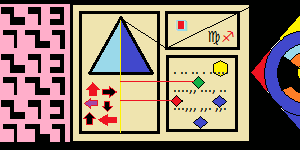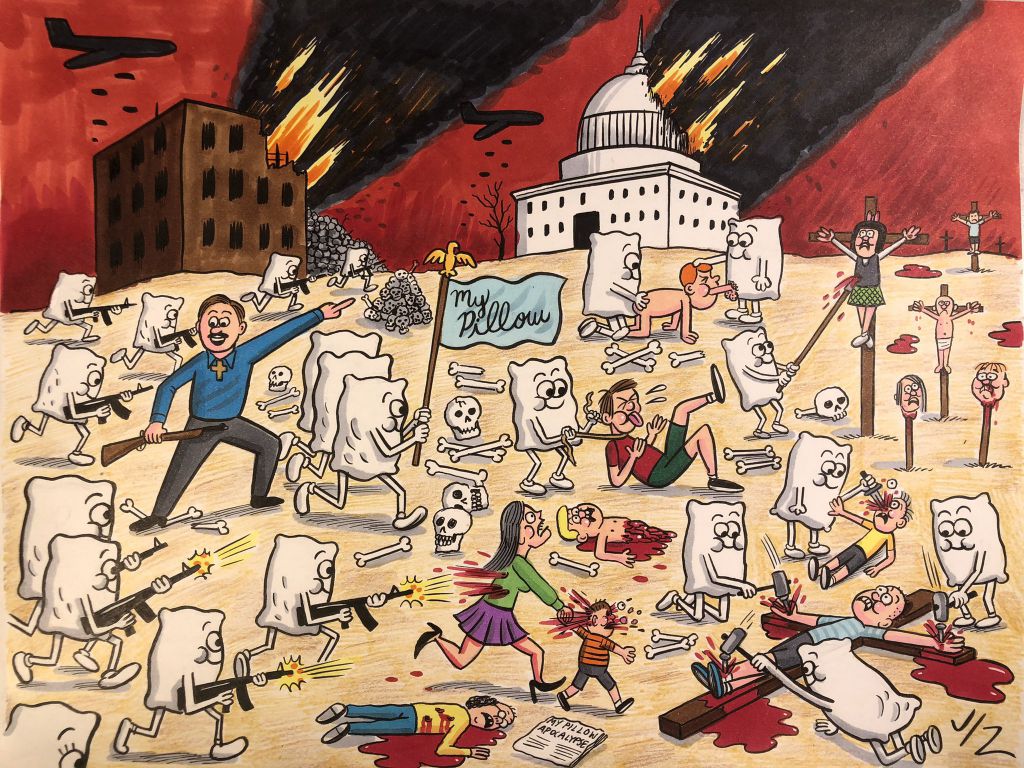May they
All have to
Go pay for
All their spreading of The Big Lie
Slate
The Defamation Suits That Could Help Put an End to Trump’s Big Lie
Jeremy Stahl
Several of the main supporters of Trump’s Big Lie that the Democrats stole the 2020 election were forced to defend their claims under oath earlier this year. Their depositions were part of a defamation lawsuit brought by a former employee of Dominion Voting Systems whose life was completely upended after the defendants falsely claimed that he personally helped steal the election. Despite repeatedly spreading the Big Lie on talk shows and in press conferences, these Trump supporters were, for the most part, unwilling to be liars under oath.
Under penalty of perjury, Rudy Giuliani, Sidney Powell, and several other supporters of the 2020 election conspiracy theory were finally forced to admit they can’t explain how the election was stolen. In lieu of specific facts and details, each offered new and embarrassing revelations about themselves and their patron, Trump. As a result, they could soon face millions of dollars in damages, as the judge weighs whether the defamation suit should proceed.
What’s clear from the depositions is this: Despite Trump and his allies’ powerful ability to delay, obstruct, and block Congressional investigators, courtrooms actually do work to create transparency and accountability. Of course, they only work when they are allowed to work. That is, courts serve their purpose when cases are allowed to proceed and when all of the basic mechanics of trial courts—sworn depositions, live testimony, discovery, and eventually jury verdicts—are allowed to happen instead of being stalled by appellate judges citing abstract and contentious legal theories (Running down the clock has been a core legal strategy of the Trump and his allies).
These lawsuits also show us something else: While forcing shameless liars to tell the truth under oath doesn’t necessarily affect their ability to spread lies in the future, it does severely limit the platform from which they spread their lies. Most media organizations fear the sort of civil liability suit Giuliani and others now face. And the lawsuits may ultimately result in crippling financial burdens that could cause others to think twice before pushing such damaging lies. Financial penalties may also force these specific liars into perpetually having to find a way to pay off the staggering debts. While it is no substitute for criminal liability, the Dominion employee lawsuit is just beginning to show the power of hitting people in their pocketbooks and forcing them to testify under oath.
Trump and his allies are facing an avalanche of lawsuits. Dominion filed separate defamation lawsuits against Fox News and others who lied and said their voting systems were rigged. A similar lawsuit was filed against Fox News by another voting company. Rep. Eric Swalwell filed suit against possible fomenters of the Jan. 6 insurrection. There is also another defamation lawsuit being brought by a former Apprentice contestant who alleged Trump sexually assaulted her (Trump is scheduled to be deposed soon for this suit). And there is yet another defamation suit by a woman who alleged that Trump raped her that was allowed to progress last month after years in a holding pattern. And finally, there is the long-delayed 2015 lawsuit by anti-Trump protesters who alleged that Trump security guards assaulted them.
The last lawsuit has already proven especially significant. It was in that suit that lawyers for the protestors deposed Trump for four hours. Last week’s deposition was the only time, since late 2015 when he was still just a candidate for the Republican presidential nomination, the former president has been forced to respond in-person to questions under oath. The trial is now scheduled for May, the Yahoo News reported on Monday. After a roughly seven-year delay, a New York jury will likely get to hear all four hours of Trump’s testimony.
All of these lawsuits could spell major monetary liability for Trump and his cronies, yes. But separate value lies in the fact that many of these suits are prominent venues to expose and spotlight the lies, corruption, and outright criminality that make up Trump World. Put another way: What the civil cases unearth could limit the election liars ability to expand their platforms. The suits also have the potential to put them in further legal jeopardy— Giuliani, for instance, was reportedly banned from Fox News following these lawsuits. And Conspiracist pillow salesman, Mike Lindell, has been blocked from spreading his own election lies by the network.
To get a sense of the kinds of revelations coming to light in the civil cases, it’s worth looking at the recent depositions in lawsuit of the former Dominion employee, Eric Coomer. In the last few months of 2020 Trump-aligned media outlets and Trump attorneys spread an allegation from a conservative podcast host named Joe Oltmann claiming that Coomer had promised to rig the election for Biden during an “Antifa phone call.” Oltmann alleges he had infiltrated the call months earlier. Here are a small number of those confessions:
Oltmann admitted that he could not name a single person to authenticate the existence of the call at the center of the lawsuit. “Other than yourself, and as you claim, Dr. Coomer, is there anyone that you can say was on the call with certainty?” An attorney for Coomer asked Oltmann. “I mean, I know for certainty that other people were on the call, yes. But I don’t know for certainty the direct identity of those people,” Oltmann stated. Oltmann couldn’t confirm the time and date of the supposed call, and he refused to name the person who connected him on the line, contrary to a court order from the judge. It is safe to say that a jury will reasonably wonder if there ever was a call.
TV host Michelle Malkin—on whose Newsmax program Oltmann first began to widely spread his allegation—could not explain the theory of how Coomer allegedly helped steal the election. “So as you sit here, you cannot cite to the Court one working theory as to how Eric Coomer could have rigged the 2020 presidential election; isn’t that true?” Coomer’s attorney asked after intensive and precise questioning urging Malkin to describe the specifics of “the steal.” “That is true,” Malkin responded.
Powell, the former Trump campaign attorney who spread the falsehood that Coomer had confessed on tape to a plot to rig the election, could not describe how Coomer had done it either. “I can’t say he flipped a switch himself,” Powell conceded. She also couldn’t recall a single thing she had done to verify Oltmann’s allegation aside from watching the Malkin clip. Indeed, she couldn’t describe in any way shape or form any aspect of how the election was stolen from Trump, as she has alleged for months. “There were thousands of stories about voting irregularities on election day. I don’t have any specific recollection of any single one of them,” Powell confessed. She also said, incredibly, that she “didn’t know” whether or not she was being sarcastic when she said, during the infamous hair dye press conference with Giuliani, that Coomer had promised to rig the election on a call before (sarcastically) adding the phrase: “Nothing to worry about here.”
Finally, as other outlets have noted, Giuliani’s deposition included several embarrassing admissions. First we learned about the free work Trump ordered him to do. We also learned about the Trump campaign’s skepticism of Giuliani’s fraud claims, as well as the fact that he got all of his evidence from social media posts. Like other defendants in the suit, Giuliani couldn’t say how the election had been fixed and admitted he had done no independent research into his claim that Coomer had stolen the election before broadcasting it to the world during that embarrassing national press conference. Did you “ask anybody in the campaign, ‘is there any information or research on Dr. Coomer or Dominion?’” Coomer’s attorney asked. “You think I had the time for that?” Giuliani admitted. “Of course, I didn’t have the time for that.”
How bad are these findings, and the potential multi-million dollar consequences, for Oltmann? Very. Just look at his behavior. He’s already failed to show up for one scheduled deposition. He’s alleged that the judge attended an “Antifa rally.” And he’s disobeyed direct court orders to reveal the sources of his access to the “Antifa call” and the details of Coomer’s private Facebook account. Oltmann’s desperation was on full display during a recent radio appearance in which he said: “I want the judge to go to jail. I don’t want the judge to be disbarred, I don’t want the judge to be taken off of the bench, I don’t want to just win on appeal…. I want the judge to be put in jail.”
His public protestations underscore the beauty of these civil cases: They are creating forums for these would-be destroyers of our democracy to face the music, however faint.
While the civil venues are not nearly as efficient as criminal suits that could ensure that the perpetrators of the attack on our democracy are never able to spread their lies again (because they’d be in prison), the suits have shown us that the tools at our disposal are working. More substantively, the suits have already limited the platforms of some of the most dangerous conspiracists around. Add to that the fact that the suits could result in mountains of legal debt and monetary damages that could prove financially crippling to many of the worst offenders. Need evidence of the dire financial straits these defendants now find themselves in? Look no further than Giuliani, who has sunk to recording personalized messages boosting previous critics in exchange for petty change on Cameo. It’s no substitute for criminal charges, but it’s a start.


